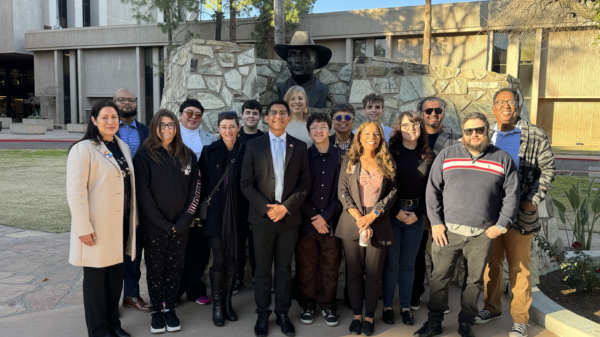Have questions about LGBTQ+ rights and protections in Arizona? You’re not alone. This FAQ covers some of the most common issues—like bathroom access, discrimination at school or work, and more.
This information is not intended as legal advice. Consult with an attorney if you have specific questions about your situation.
Select a Scenario
Can an employer discriminate against me because of my sexual orientation or gender identity?
Employers with 15 or more employees are prohibited by Title VII of the 1964 Civil Rights Act from discriminating on the basis of sex, and the U.S. Supreme Court held in 2020 (Bostock v. Clayton County), that firing someone on the basis of sexual orientation and gender identity is sex discrimination.
Arizona state law does not currently include explicit statewide protections against employment discrimination based on sexual orientation or gender identity. However, several Arizona cities and counties—such as Phoenix, Tucson, Mesa, and Flagstaff—have local nondiscrimination ordinances that protect LGBTQ+ employees in both public and private workplaces (often applying to employers with as few as one or more employees). For more information on specific cities and counties, visit this site.
If your rights are violated:
- Try to document everything like emails or HR papers that might be relevant.
- If you think that you have experienced discrimination at work, you can file a complaint with the U.S. Equal Employment Opportunity Commission (EEOC), or with the Civil Rights Division of the Arizona Attorney General’s Office.
Can a landlord refuse to rent to me?
The federal Fair Housing Act prohibits sex discrimination by most landlords and the Supreme Court held in 2020 (Bostock v. Clayton County), that discrimination on the basis of sexual orientation and gender identity is a form of sex discrimination. Under this reasoning, the Fair Housing Act also should be read to prohibit discrimination on the basis of sexual orientation or gender identity.
Arizona does not currently have a statewide law explicitly prohibiting housing discrimination based on sexual orientation or gender identity. However, several cities and towns have local nondiscrimination ordinances that protect LGBTQ+ people in housing. For information regarding specific cities, click here. These local laws can apply to both public and private housing providers, depending on the jurisdiction.
Housing discrimination against people with HIV/AIDS, or people perceived to have HIV/AIDS, is also illegal under the federal protections against disability discrimination.
If your rights are violated:
- It’s important to document every interaction and communication that could help demonstrate what happened.
- If you believe you’ve been discriminated against, your options depend on where the discrimination occurred and whether any local protections apply.
Am I protected from discrimination in public accommodations, like shops and restaurants?
There is currently no federal law that explicitly prohibits discrimination based on sexual orientation or gender identity in public accommodations such as restaurants, stores, hotels, or theaters.
Arizona state law also does not include statewide protections for LGBTQ+ people in public accommodations. However, several Arizona cities and towns have local nondiscrimination ordinances that make it illegal for businesses open to the public to deny service or otherwise discriminate based on sexual orientation or gender identity. To find information about specific cities and towns, click here. These local ordinances vary, so your specific protections depend on where the discrimination occurs and which city’s laws apply.
Are LGBTQ+ students protected from discrimination in schools?
Title IX of the Education Amendments of 1972 bans discrimination on the basis of sex by public schools, and the Supreme Court held in 2020 (Bostock v. Clayton County) that discrimination on the basis of sexual orientation and gender identity is sex discrimination. Thus, Title IX should be interpreted to prohibit students from discrimination on the basis of sexual orientation or gender identity. Many federal courts have held that Title IX requires public schools to respond to harassment based on appearance or behavior that doesn’t conform to gender stereotypes: boys who wear makeup, girls who wear pants, or students who are transgender or non-binary.
The Supreme Court has taken up a case presenting the question of whether it violates Title IX and the Constitution to bar transgender girls from participating in sports at school. While the law in this area is still evolving, a number of courts have found that Title IX and the Constitution protect transgender students’ right to access sex-separated programs and facilities like restrooms consistent with their gender identity.
Arizona does not currently have a statewide law explicitly protecting LGBTQ+ students from discrimination in schools, but several local school districts have adopted inclusive nondiscrimination or anti-bullying policies that cover sexual orientation and gender identity. These protections can vary, so your rights may depend on where you go to school.
In addition, the First Amendment right to free expression can also apply to school dress codes, especially when there are different rules for boys than there are for girls. The First Amendment protects your right to express yourself in public schools. That includes bringing a same-sex date to prom or any school event and talking about LGBTQ topics. Your right to be yourself in school includes the right to be transgender or non-binary, and to transition at school.
If your rights are violated:
- Document everything. Take notes and keep copies of any emails with school administrators, relevant school forms, etc. If there isn't a preexisting paper trail from emails or official documents, make your own. Take notes and write down dates, places, times, what happened, and who was there.
- If anyone at school is harassing or threatening you, it’s crucial that you report every incident to a principal, teacher or counselor. Usually, schools must be put on notice before they can be held legally responsible for protecting you.
- If you have reported harassment or any other kind of discrimination to your school officials and they have done little or nothing to stop it, we encourage you to contact the ACLU of Arizona or the national ACLU LGBTQ & HIV Project for help weighing your options.
Does the law protect my right to use the restroom consistent with my gender identity?
Currently, Arizona does not prohibit transgender individuals from using restrooms that align with their gender identity, though state lawmakers have introduced bills but have not yet been successful in passing them. Some school districts also have policies allowing transgender students to use the bathrooms that align with their gender identity.
Outside of Arizona, your rights may vary state to state. In some places, state and local laws that prohibit discrimination based on gender identity or expression should protect transgender people’s right to use public restrooms and locker rooms that match their gender identity. In other states, lawmakers have banned transgender people from using some facilities consistent with their gender identity.
The ACLU believes that laws that ban sex discrimination should also be interpreted by the courts to protect transgender people. While federal law in this area is uncertain, most courts to address this question have found in favor of transgender people being able to access facilities most consistent with their gender identity.
What if I have different gender markers on different IDs or records?
There is no legal obligation to have consistent gender markers on various documents, and depending on where they live or were born, a person may be able to obtain the gender marker on each document that is most comfortable for them.
Different gender markers on documents may cause administrative confusion if you show them at the same time, or if there is a discrepancy between the gender marker on your ID and the marker in your record. The confusion may be uncomfortable when interacting with an agent but can usually be cleared up with a conversation.
Check back soon for a comprehensive guide about gender marker and name changes in Arizona.
Can I still lawfully access gender affirming healthcare?
If you’re over age 18, there are no legal restrictions on accessing care. Arizona does not restrict access to puberty blockers or hormone replacement therapy with parental permission if you are under 18. However, Arizona doctors are not allowed to provide “irreversible” gender-affirming surgery, including top surgery, to people under 18. If doctors determine that you are intersex, you may be able to access these surgeries as a minor.
Additional resources:
- Here is a current state-by-state map of restrictions on accessing gender affirming care.
- Check back soon for a comprehensive legal guide for transgender youth in Arizona that includes more details on healthcare for transgender youth.
What about other anti-trans executive orders and actions?
To learn more about the ACLU’s response to President Trump’s anti-trans attacks and the evolving landscape, click here.
Stay Informed
Sign up to be the first to hear about how to take action.
By completing this form, I agree to receive occasional emails per the terms of the ACLU’s privacy statement.
By completing this form, I agree to receive occasional emails per the terms of the ACLU’s privacy statement.


